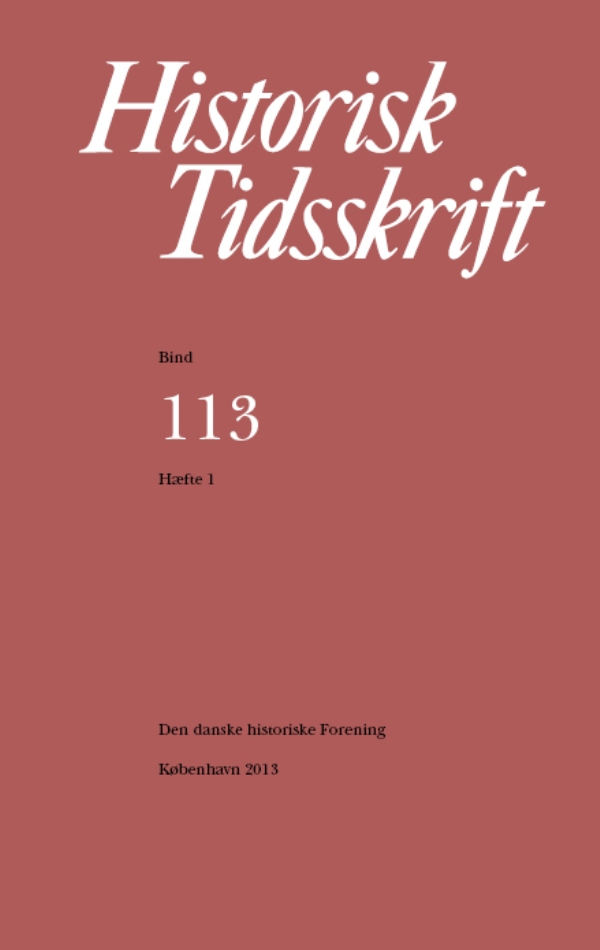Den store tyveridebat 1813-17
DOI:
https://doi.org/10.7146/ht.v113i1.56592Resumé
The Great Debate on Theft and Burglary, 1813-17A turbulent period followed the English assault on Copenhagen 1807 when the kingdom of Denmark-Norway became involved in the European war. From 1811, rampant inflation undermined the purchasing power of wages and living conditions deteriorated. In the summer of 1813, an attempt by the government to regulate the situation by the enforcement of ceiling prices broke down. As food prices multiplied several times over six months, crime rates exploded, especially in burglary and common theft. Social unrest lurked beneath the surface, forcing the authorities to act more vigorously.Police headquarters monitored the development closely. In September and again in December, the chief of police issued proclamations by which he admonished citizens to remain vigilant and detain thieves so that the police might bring them to justice.At the same time, the prevailing economic and social crisis triggered extensive public debate. In spite of the strict censorship, the handling of the situation by the authorities was subject to criticism. A prize competition for the most adequate set of measures to combat theft and burglary further stimulated the discussion. The best three out of nineteen entries were immediately published in print.Thanks to these inputs, a government commission set up in May 1815 with a view to revising the parts of the penal code that concerned theft had a heavy arsenal of good ideas and specific proposals at its disposal. Its membership was made up of a small group of leading government officials with Anders Sandøe Ørsted as the central figure. Ørsted, who was not only a senior official, but also a former Supreme Court judge and an academic expert on jurisprudence, had a few years earlier published a comprehensive treatise on Danish larceny law. Therefore, one would expect a great deal of the substance of this work to be utilized in the current preparation of a law reform, but it turned out otherwise. Ørsted proposed proportionality between the length of the penalty and the value of the stolen goods, thereby departing from the traditional principle of letting the number of repeated offences determine the severity of the sentence. At a time when the established order of absolute monarchy was being challenged, half of the commission members were unwilling to accept this sudden reversal. It was, however, not only due to political considerations, but also based on principled legal views.His advisors divided, King Frederick VI did not venture to proceed with the reform project; not until the end of the eighteen thirties did it once again get under way. Incremental changes did occur, though: From 1816, petty thieves caught at their first offence were eligible to short terms of imprisonment on bread and water instead of prolonged serving in a house of correction. The Copenhagen police department expanded its activities, for instance by setting up local police stations and keeping records of citizens and their behaviour. The use of police spies and agents provocateurs were other innovations. Not least thanks to increased policing crime in Copenhagen was gradually brought under control. Finally, the public debate and the higher profile of the police made citizens more concerned with security than before, which by itself formed a higher barrier against criminal activity.Downloads
Publiceret
Citation/Eksport
Nummer
Sektion
Licens
Ophavsret til bidrag i Historisk Tidsskrift tilhører forfatterne og Den danske historiske Forening som udgiver af Historisk Tidsskrift. For illustrationer gælder den ophavsret, som står anført i billedteksten. Ophavsretslovens almindelige bestemmelser gælder, hvilket vil sige, at ophavsretten gælder i 70 år efter forfatterens død. Bidrag i Historisk Tidsskrift må derfor, med forbehold for en ”moving wall” på tre år, frit downloades, læses, gemmes, anvendes og citeres (med kildeangivelse) i privat og videnskabelig sammenhæng, men de må ikke helt eller delvis genudgives af tredjepart, heller ikke i redigeret form, uden tilladelse fra forfatterne og Den danske historiske Forening. Henvendelse skal i så fald rettes til Historisk Tidsskrifts redaktion på histtid@hum.ku.dk.





